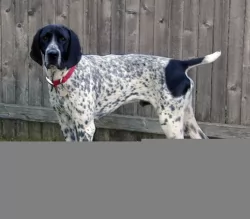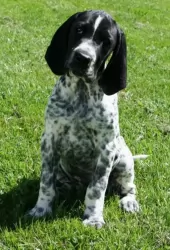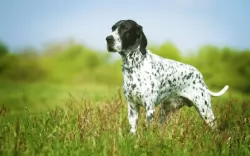 MyDogBreeds
MyDogBreeds Sussex Spaniel is originated from United Kingdom but Braque d'Auvergne is originated from France. Sussex Spaniel may grow 27 cm / 10 inches shorter than Braque d'Auvergne. Sussex Spaniel may weigh 42 kg / 92 pounds lesser than Braque d'Auvergne. Both Sussex Spaniel and Braque d'Auvergne has same life span. Both Sussex Spaniel and Braque d'Auvergne has almost same litter size. Sussex Spaniel requires Moderate maintenance. But Braque d'Auvergne requires Low maintenance
Sussex Spaniel is originated from United Kingdom but Braque d'Auvergne is originated from France. Sussex Spaniel may grow 27 cm / 10 inches shorter than Braque d'Auvergne. Sussex Spaniel may weigh 42 kg / 92 pounds lesser than Braque d'Auvergne. Both Sussex Spaniel and Braque d'Auvergne has same life span. Both Sussex Spaniel and Braque d'Auvergne has almost same litter size. Sussex Spaniel requires Moderate maintenance. But Braque d'Auvergne requires Low maintenance
 The Sussex Spaniel comes from Sussex in southern England. The whole purpose of his development was for him to rush between reeds, causing birds to fly up and for their owners to then shoot them so that they could retrieve them.
The Sussex Spaniel comes from Sussex in southern England. The whole purpose of his development was for him to rush between reeds, causing birds to fly up and for their owners to then shoot them so that they could retrieve them.
His history dates back to the 19th century when breeding for the dog started. The first breed standard was also written during this time.
It was about in 1969 that some of these Sussex Spaniels were imported to the United States where they were referred to as a sporting breed. Today they are still a rare breed.
 Sometime over 5 centuries ago, in the Cantal Region of France, was born a hunting breed, that might be the real ancestor of today’s pointing hunter dogs. Perhaps the oldest of all pointing gun dog is the Braque d’Auvergne. This breed comes from Central France in the region of Auvergne. This breed was developed prior to written dog breeding records in order to hunt in this region and find, point, flush out and retrieve fowl. This breed is clearly one of if not the oldest breeds in the French Braque. There is no agreement among historians on what breed is the oldest of the European pointing dogs and where they were developed – was it Spain or was it France? It is thought that the Braque Francais Gascogne is the original one of these in the early 1600’s while the Braque d’Auvergne came soon after. Due to the different hunting needs in the different parts of France, the Braque Francais Gascogne was crossed with a lot of other local scent hounds. The Braque d’Auvergne is one of the very oldest of all of these. There are records of the breeds existence in the 1700’s. It is probable that the Braque d’Auvergne was developed by crossing local dogs with Gascogne as well as with the Petit Bleu de Gascogne and the Grand Bleu de Gascogne.
Sometime over 5 centuries ago, in the Cantal Region of France, was born a hunting breed, that might be the real ancestor of today’s pointing hunter dogs. Perhaps the oldest of all pointing gun dog is the Braque d’Auvergne. This breed comes from Central France in the region of Auvergne. This breed was developed prior to written dog breeding records in order to hunt in this region and find, point, flush out and retrieve fowl. This breed is clearly one of if not the oldest breeds in the French Braque. There is no agreement among historians on what breed is the oldest of the European pointing dogs and where they were developed – was it Spain or was it France? It is thought that the Braque Francais Gascogne is the original one of these in the early 1600’s while the Braque d’Auvergne came soon after. Due to the different hunting needs in the different parts of France, the Braque Francais Gascogne was crossed with a lot of other local scent hounds. The Braque d’Auvergne is one of the very oldest of all of these. There are records of the breeds existence in the 1700’s. It is probable that the Braque d’Auvergne was developed by crossing local dogs with Gascogne as well as with the Petit Bleu de Gascogne and the Grand Bleu de Gascogne.
In all of Western Europe, the region of Auvergne is not very populated and has unique geography in that is hilly and has many extinct and eroded volcanoes. A lot of the region is still unpopulated. In this environment, wildlife has flourished, and hunting is successful in providing food for the regions people. This circumstance with an abundance of birds, led to the breeding of the Braque Auvergne to specialize in hunting in this area. The breed is not very popular outside of Auvergne and probably never was. That fact allowed them to be devastated by the Second World War. The Reunion des Amateurs de Braque d’Auvergne (RABA) was started to promote the pure breeding and the protection of the d’Auvergnes. But when Auvergnes was occupied during the war, the slowed breeding of the Braque d ‘ Auvergne almost eliminated the breed. There might have only been about 25 dogs left following the end of the war. These remaining dogs were used to revive the breed, but it is still uncommon, but not rare. Individuals have been imported by other countries including North America. The United Kennel Club (UKC) accepted the breed in 2006 but is not accepted by the AKC (American Kennel Club). The breed is still a working breed and outside of France, very rare.
 With his low, long body and short legs, this beautiful golden liver color spaniel has long, silky ears and a long, feathery tail.
With his low, long body and short legs, this beautiful golden liver color spaniel has long, silky ears and a long, feathery tail.
He is a moderate shedder. He is quite a distinctive looking dog with his silky coat and sombre expression. You’d descibe him as medium sized dog, standing at between 33 – 38cm in height and weighing 16 -20kg.
The Sussex Spaniel is more slow and sedate than the Cocker Spaniel but he still makes an excellent pet and companion.
He is strong and robust. He is clever too, but slightly stubborn, while also being clownish and entertaining. They’re the kind of dogs who bond strongly with their family and aren’t that enthusiastic with strangers.
They take a while to warm towards people they don’t know. He is steady, reliable and determined and makes a good watchdog. Because he is gentle and even tempered he makes an ideal pet for children and he is able to get on well with other dogs too.
It’s good to have them trained and socialized as they become even more amicable around other people and dogs they don’t know.
 The Braque d’Auvergne is a well built, strong hunting dog with long ears, a large head and a docked tail. His coat is white with black markings and black ears and head. The breed looks a lot like all the other pointing dogs from France. They are medium in stature and has the appearance of a working gundog. He is athletic, muscular and fit. Docking the tail is outlawed in many countries and all of the United Kingdom. In that case the tail is high on the rump and always straight. Their face and head are big for the size of the body and shaped like an oval. With a long muzzle, deep set eyes and a gentle expression, they are kindly and handsome dogs. Their skin is loose but not droopy or wrinkled like hound dogs.
The Braque d’Auvergne is a well built, strong hunting dog with long ears, a large head and a docked tail. His coat is white with black markings and black ears and head. The breed looks a lot like all the other pointing dogs from France. They are medium in stature and has the appearance of a working gundog. He is athletic, muscular and fit. Docking the tail is outlawed in many countries and all of the United Kingdom. In that case the tail is high on the rump and always straight. Their face and head are big for the size of the body and shaped like an oval. With a long muzzle, deep set eyes and a gentle expression, they are kindly and handsome dogs. Their skin is loose but not droopy or wrinkled like hound dogs.
 He is a low drooling dog and he adapts easily to life with his human family, preferably in the countryside.
He is a low drooling dog and he adapts easily to life with his human family, preferably in the countryside.
He isn’t the most intelligent breed, but most people love him just like that because he’s eager to please and just wants to be your trusted, loyal pet and companion.
 This is a gentle, adaptable and obedient breed. With their intelligence and affectionate nature, they make great family dogs and are eager to please their people. Living with other dogs is fine but not with small, prey size animals. The Braque d’Auvergne should never be left alone pets like gerbils and hamsters. They must be socialized to cats as pets and not prey before living with them successfully. They need to work closely with one human partner. They are first and foremost a hunting dog and need some sort of hunting simulation. They are devoted to their families and want to be constantly in their presence. This can lead to separation anxiety if they are left alone too much. They are great with children and need a family.
This is a gentle, adaptable and obedient breed. With their intelligence and affectionate nature, they make great family dogs and are eager to please their people. Living with other dogs is fine but not with small, prey size animals. The Braque d’Auvergne should never be left alone pets like gerbils and hamsters. They must be socialized to cats as pets and not prey before living with them successfully. They need to work closely with one human partner. They are first and foremost a hunting dog and need some sort of hunting simulation. They are devoted to their families and want to be constantly in their presence. This can lead to separation anxiety if they are left alone too much. They are great with children and need a family.
 Your Sussex, like any other dog, is going to be prone to some diseases and conditions. If you are going for a puppy, always look for a reputable dog breeder, as this at least gives your dog a better chance of a healthy life.
Your Sussex, like any other dog, is going to be prone to some diseases and conditions. If you are going for a puppy, always look for a reputable dog breeder, as this at least gives your dog a better chance of a healthy life.
This is a congenital heart disease where blood doesn't flow properly and where the right side of the heart works harder and actually enlarges.
If the obstruction is severe, it can cause arrhythmia or congestive heart failure.
If the stenosis is mild, you may not even notice any conditions, but if it's severe, your pet may have difficulty with breathing, his stomach may be distended, and with strenuous exercise he could even collapse.
This is when a disc in the spine ruptures and pushes upward into the spinal cord. It can be an injury or an inherited condition.It is painful and will include anti-inflammatory medications and possibly surgery.
 The Braque d’Auvergne is a healthy breed but can face some of the same health concerns as other pointers and hunting dogs. The long, droopy ears can get infected easily if wet and need to be cleaned regularly so that food or dirt are not trapped their either. Because of the small gene pool however they may be at risk for several issues. The breeders in France express concerns about possible hip dysplasia and testing is highly recommended. Because they are at risk for other conditions that might not show up until later in life, it is also recommended that they be tested by the Canine Eye Registration Foundation (CERF) as well as the Orthopedic Foundation for Animals (OFA).
The Braque d’Auvergne is a healthy breed but can face some of the same health concerns as other pointers and hunting dogs. The long, droopy ears can get infected easily if wet and need to be cleaned regularly so that food or dirt are not trapped their either. Because of the small gene pool however they may be at risk for several issues. The breeders in France express concerns about possible hip dysplasia and testing is highly recommended. Because they are at risk for other conditions that might not show up until later in life, it is also recommended that they be tested by the Canine Eye Registration Foundation (CERF) as well as the Orthopedic Foundation for Animals (OFA).
 Because of the long, silky hair, brushing your Sussex twice a week will be necessary to prevent matting from dirt adhering to the fur.
Because of the long, silky hair, brushing your Sussex twice a week will be necessary to prevent matting from dirt adhering to the fur.
The insides of those long floppy ears can be a breeding spot for bacteria as they don’t easily dry. When you brush him, check inside the ears to make sure they aren't red which could be a sign of ear infection.
Remember, if you don’t like to do all the grooming chores there are, a grooming parlour will do the chores for you. They cut your dog’s hair, check inside his ears, clean his teeth and trim his nails.
Every dog needs excellent food to be healthy. Many people feed their pets the wrong kinds of foods and then wonder why they have to fork up so much on vets fees.
If you feed your Sussex Spaniel one of the commercial manufactured foods, make sure its one of the good ones packed with vitamins and minerals. Tasty home-made food added to his kibble a couple of times a week can do him the world of good if its kept simple – no spicey, exotic foods that can upset the stomach.
Boiled chicken, brown rice or pasta and spinach, sweet potatoes and carrots all chopped up and mixed into the dry kibble once or twice a week will ensure a healthy, happy pet.
To avoid skin allergies and a dull coat, try and add in some raw meat occasionally. Always make sure he has access to fresh, cool water.
These dogs have been accustomed to a life of running in open spaces and they’re going to want lots of exercise. They love ball games and they love a walk in the countryside with lots of new scents to follow.
It’s why this dog isn’t suited to life in a small city property. He needs space and the outdoors to use up his energy.
 The Braque d’Auvergne needs a high-quality diet fit for a working dog but not too much to make him obese. They are an active breed to choose a formula that is designed for working dogs.
The Braque d’Auvergne needs a high-quality diet fit for a working dog but not too much to make him obese. They are an active breed to choose a formula that is designed for working dogs.
Although no studies have been conducted on the Braque d’Auvergne’s health issues there are many conditions that similar breeds are susceptible to and the d’Auvergne might be as well. This includes any of the following:
This is an active, working dog who needs a lot of stimulation and exercise. The only real appropriate exercise for these dogs is hunting or outings in the woods. He not only needs the exercise, but he also needs to stimulate his sense of smell and his gundog intelligence. He might excel in lure chase or even a form or barn hunt. They certainly could excel at obedience trials and perhaps rally. If you are a weekend hunter then this is the ideal dog for you. They are so easy to train that they surpass other pointers for success with casual hunters. They hunt at a slower pace than many other gundogs. Their intelligence and athleticism lend itself well to agility and flyball also. They need a large (+acres)fenced in area to run and play.